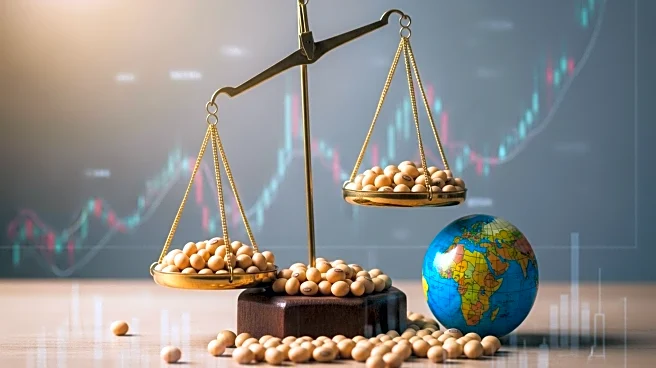What is the story about?
What's Happening?
President Trump has announced plans to impose a 100% tariff on Chinese imports starting November 1, following China's decision to restrict rare-earth materials. This announcement has caused significant market volatility, particularly affecting soybean futures, which dropped in overnight trading. The uncertainty surrounding the tariffs has led to a decline in soybean purchases from the U.S., while imports from Brazil to China have surged. Despite the initial threat, Trump later reassured that relations with China were stable, and Treasury Secretary Scott Bessent confirmed that a planned meeting between Trump and Chinese President Xi Jinping is still on track.
Why It's Important?
The proposed tariffs could have substantial implications for U.S. agriculture, particularly the soybean industry, which relies heavily on exports to China. A 100% tariff would likely increase costs for Chinese buyers, potentially reducing demand for U.S. soybeans and impacting American farmers' revenues. Additionally, the broader trade tensions could affect other sectors reliant on Chinese imports, leading to increased prices for consumers and businesses. The situation underscores the fragile nature of U.S.-China trade relations and the potential for economic disruption if tariffs are implemented.
What's Next?
If the tariffs are imposed, businesses may rush to frontload orders in October to avoid increased costs, potentially leading to short-term spikes in trade activity. The upcoming meeting between President Trump and President Xi Jinping could be pivotal in determining the future of U.S.-China trade relations. Stakeholders in the agriculture and manufacturing sectors will be closely monitoring developments, as any resolution or escalation could significantly impact their operations and financial outlook.
Beyond the Headlines
The ongoing trade tensions highlight the complex interplay between international diplomacy and domestic economic policy. The potential tariffs raise ethical questions about the use of trade policy as a tool for geopolitical leverage, and the long-term impact on global supply chains and economic stability. The situation also reflects broader trends in protectionism and the challenges of navigating international trade in an increasingly interconnected world.
















